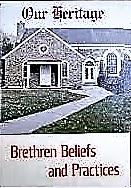THE APPLICATION OF NON-RESISTANCE
DIFFERENTIATES THE CHURCH FROM THE NATION OF ISRAEL
1. Identification of the Church with the nation of Israel
confuses the whole teaching on non-resistance. Israel was a nation of this
world. It had boundaries, a specific land, a capital city, a throne, a king, a
specific nationality. But the Church is not a kingdom of this world. It has a
Ruler Who is in heaven. It is made up of a people sharing the life of the
Spirit and belonging to every nationality on the face of the earth. The
principles that govern the one cannot be the principles that guide and guard
the other. It is therefore completely illogical to try to apply the laws of
Israel to the Church.
2. It appears that God granted to Israel the right to wage
war to protect its boundaries and its people. At least it can be said that in
large part this was the pattern of conduct in Israel. But there is strong
reason to believe that it was never the plan of God to use human force to
protect this nation. From its very beginning it was God's purpose to use Divine
power to protect and maintain this people. By divine power this nation was
delivered from Egypt (Deut. 4:33-40). By Divine power they were sustained through
40 years of wilderness wanderings. By Divine power they crossed the Jordan .and
by Divine power Jericho was leveled to the ground. When they were returning to
the land from captivity in Babylon God said, "Not by my might, nor by
power, but by my Spirit" (Zech. 4:6).
3. But even though physical force was commanded by the Lord
and used by Israel, that method is not granted to the members of the Church.
Such show of force on the part of the church has always degraded the church,
destroyed its testimony, and decimated its own ranks. The church has been
found to be fighting against itself. Believer has killed believer, and killed
the very ones they should be winning to Christ. When the church and the world
were joined at the so-called conversion of the Emperor Constantine, and
conquering by the sword was made the practice of the Church, the Devil had at
last found a weapon to derail the church from accomplishing the task divinely
committed to it.
(The world today degrades the Church and uses this to show its hypocrisy when they speak on these issues.)

















